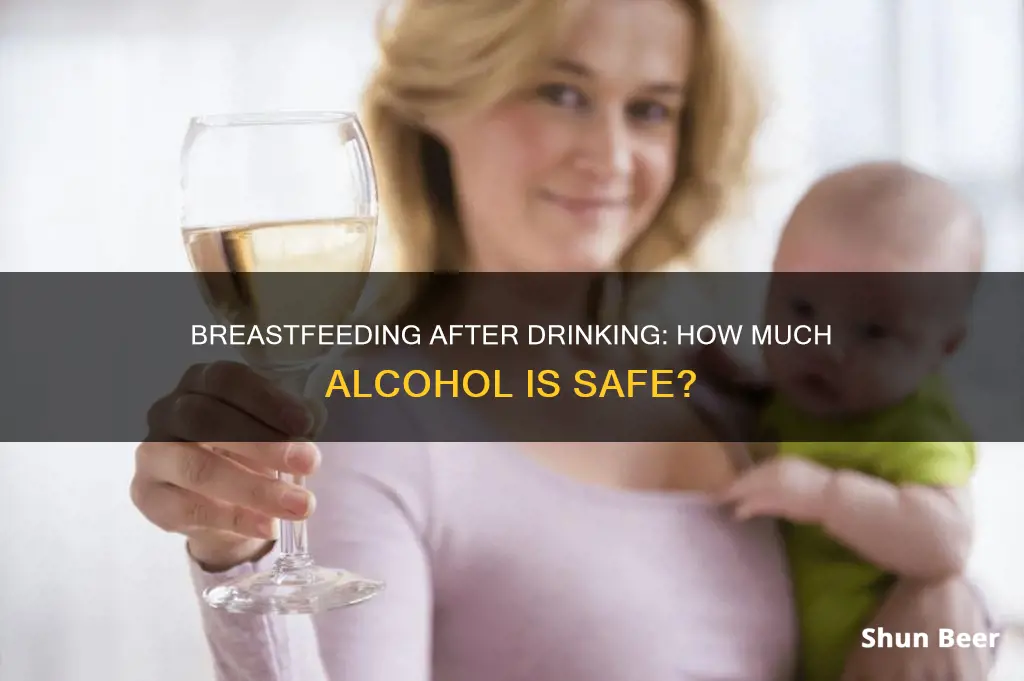
Breastfeeding and alcohol consumption is a topic of concern for many new mothers. While it is generally advised to avoid drinking alcohol while breastfeeding, occasional low to moderate alcohol consumption is unlikely to harm the baby. The key consideration is planning and timing. It takes around two hours for the average adult to metabolise one drink, and the alcohol level in breast milk closely parallels the alcohol level in the mother's bloodstream. Therefore, it is recommended to wait for at least two hours per drink before breastfeeding. For example, if a mother has two drinks, it is advised to wait for four to five hours before breastfeeding.
| Characteristics | Values |
|---|---|
| Number of beers considered safe | 1-2 |
| Waiting time before breastfeeding | 2-5 hours |
| Effect on the infant | Sleep disturbances, impaired immune function, delay of motor development, potential impairment of cognitive development, reduction in ability for abstract reasoning at school age |
| Effect on the mother | Impaired judgment, reduced milk supply |
What You'll Learn

How long after drinking can you breastfeed?
It is recommended that breastfeeding parents wait at least two hours after drinking one alcoholic beverage before breastfeeding their baby. This is because it takes around two hours for the average adult to metabolize one drink. If you have had two drinks, you should wait four to five hours.
The amount of time you need to wait can vary depending on several factors, including:
- The number of drinks you have had—for example, three drinks may require a wait time of six to eight hours.
- How quickly your body breaks down alcohol.
- Whether you consumed alcohol on an empty stomach or with food.
- Your weight—smaller people generally need more time to process and eliminate alcohol from their bloodstream.
It is important to note that the above recommendations are generalized guidance, and individual factors can vary. The safest option is to wait until you feel “neurologically normal” before breastfeeding.
If you need to breastfeed before the alcohol has left your system, you can express milk before consuming alcohol and feed your baby with that. However, drinking alcohol can also delay the let-down reflex, which may result in reduced milk supply.
Hines Park, Michigan: Beer Drinking Allowed?
You may want to see also

What are the risks of drinking alcohol while breastfeeding?
Drinking alcohol while breastfeeding can pose several risks to both the infant and the breastfeeding parent. Here are some key points to consider:
Risks for Infants:
- Developmental Delays: Research suggests that daily drinking or consuming more than one drink per day may result in developmental delays in infants, such as reduced motor control, which is important for sitting up, crawling, and playing.
- Sleep Disturbances: Alcohol in breast milk can negatively affect an infant's sleep patterns, resulting in increased agitation and reduced sleep duration.
- Decreased Milk Intake: Alcohol can interfere with the milk ejection reflex, leading to a decrease in the amount of milk consumed by the infant.
- Weight Gain Issues: Regular exposure to alcohol in breast milk may cause abnormal weight gain or trouble gaining weight in infants.
- Potential Cognitive Impairment: Some studies indicate potential impairment of cognitive development and abstract reasoning abilities in school-aged children exposed to alcohol through breast milk.
- Immune Function: Alcohol consumption by the breastfeeding parent may negatively impact the infant's immune function.
Risks for Breastfeeding Parents:
- Impaired Judgment: Alcohol consumption can impair judgment and compromise the safety of the infant. It is essential to have a sober adult caregiver if drinking excessively.
- Decreased Milk Production: Regular alcohol consumption can negatively affect milk production and the milk ejection reflex, leading to a potential decrease in overall milk supply.
- Delayed Reflexes: Alcohol can delay the let-down reflex, resulting in the baby receiving less milk during feeding.
- Prolonged Alcohol Presence in Breast Milk: Alcohol can be detected in breast milk for about 2 to 3 hours per drink consumed. The more alcohol consumed, the longer it takes to clear the system and the breast milk.
While an occasional drink is generally considered safe, it is important to allow sufficient time for the alcohol to leave the breast milk before breastfeeding. The recommended waiting time is at least 2 hours per drink.
BYOB: Beer Gardens and Personal Alcohol Consumption
You may want to see also

How long does alcohol stay in breast milk?
It is recommended that breastfeeding mothers avoid drinking alcohol altogether. However, drinking up to one standard drink per day is not known to be harmful to an infant. A standard drink is defined as:
- 12 ounces of 5% ABV beer (about one can)
- 8 ounces of 7% ABV malt liquor (around the size of a standard drinking glass)
- 5 ounces of 12% ABV wine (one glass)
- 1.5 ounces of 40% ABV (80-proof) liquor (one shot)
If you do choose to drink alcohol, it is important to wait at least two to three hours after consuming one drink before breastfeeding. This allows time for the alcohol to leave your breast milk. The more alcohol you consume, the longer it will take for the alcohol to leave your breast milk. For example, alcohol from two drinks can be detected in breast milk for about four to five hours, while alcohol from three drinks can be detected for about six to eight hours.
It is important to note that alcohol can negatively impact your milk supply and your let-down reflex, which is a hormonal reaction that allows your body to eject milk. Regularly consuming alcohol can lead to a decrease in your milk supply and a delay in the let-down reflex, resulting in your baby getting less milk.
Additionally, drinking alcohol can impair your judgment and ability to care for your child safely. It is recommended to have a sober adult care for your infant if you plan on drinking more than one drink.
Ginger Beer: Healthy Daily Habit or Best in Moderation?
You may want to see also

Does pumped milk have the same amount of alcohol?
Pumping and dumping will not remove alcohol from your breast milk or bloodstream. As long as there is alcohol in your system, it will be present in your breast milk. The U.S. Centers for Disease Control and Prevention (CDC) warns that "pumping and dumping" is not a quick solution for removing alcohol from your breast milk.
The CDC recommends waiting a minimum of two hours after consuming one drink before breastfeeding. If you've had two drinks, you should wait four to five hours. The more you drink, the longer alcohol will take to clear your system.
Alcohol can remain in breast milk for two to three hours, with the highest levels occurring 30 to 60 minutes after drinking. It's important to note that alcohol can take longer to peak in some individuals. Pay attention to how you feel and the time elapsed since your last drink.
To ensure your infant's safety, it is crucial to plan ahead. Pump before drinking or have formula ready if you intend to consume alcohol. Additionally, consider how your infant will be fed after you drink.
Beer and Fruit: A Refreshing Combination?
You may want to see also

What are the effects of drinking alcohol while breastfeeding?
While occasional low or moderate alcohol consumption is unlikely to harm your baby, it's important to be cautious as a breastfeeding parent. Not drinking alcohol is the safest option, but having up to one standard drink per day is generally not known to be harmful to infants. However, it's crucial to wait at least two to three hours after consuming alcohol before breastfeeding to minimise the concentration of alcohol in breast milk. Here are some of the effects of drinking alcohol while breastfeeding:
Effects on Your Ability to Care for Your Baby
Alcohol can impair your judgment, reaction time, and ability to care for your baby safely. It's important to ensure you remain aware of your baby's needs and have your reflexes intact. If you plan to drink heavily, it's recommended to have a sober adult around to help with childcare. Additionally, never share a bed, armchair, or sofa with your baby if you've consumed alcohol, as this increases the risk of sudden infant death syndrome.
Effects on Milk Supply
Contrary to popular belief, alcohol does not help with breastfeeding. While a barley component in beer can boost prolactin production, which is a hormone that helps produce milk, alcohol alone does not have this effect. In fact, research suggests that alcohol inhibits the milk ejection reflex, leading to reduced milk intake by the baby. One study found that women who consumed alcohol produced 20% less milk at the next feed compared to those who had a non-alcoholic drink.
Effects on Your Baby's Sleep
Drinking alcohol while breastfeeding can negatively affect your baby's sleep patterns. Studies have shown that babies exposed to alcohol through breast milk may sleep for shorter periods, experience increased REM sleep, and have disrupted sleep. This can result in increased agitation and inconsistent responses from the mother.
Beer and Bubbles: Can Beer Make Your Pee Sudsy?
You may want to see also
Frequently asked questions
It's recommended to wait at least 4 to 5 hours after drinking two beers before breastfeeding.
Drinking alcohol while breastfeeding can cause:
- Sleep disturbances in the baby
- Increased REM sleep in the baby 3.5 to 24 hours after exposure
- Decreased milk intake by the baby
- Impaired immune function
- Delayed motor development
- Potential impairment of cognitive development
- Reduction in the ability for abstract reasoning at school age
While occasional low or moderate alcohol consumption is unlikely to harm the baby, not drinking alcohol is the safest option while breastfeeding.







